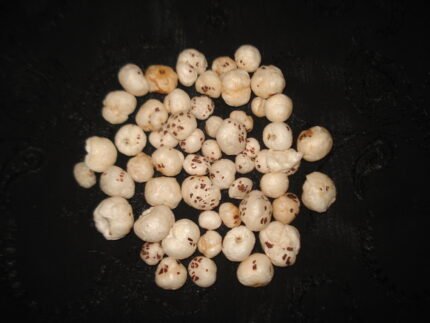Medically reviewed by Dr. Ramesh Gaddam, M.D. — Written by Sumalatha, D.N.H.E
Phool Makhana, also known as Fox Nut or Lotus Seed, is a nutritious and edible seed obtained from the lotus plant (Nelumbo nucifera).
It is commonly used in Asian cuisines, particularly in Indian, Chinese, and Japanese dishes.
The term “Phool Makhana” is of Hindi origin, where “Phool” means flower, and “Makhana” means seed.
1. Nutrition of Phool Makhana
Nutritional composition of 100 grams of dried Phool Makhana:
| Nutrient | Amount (per 100g) |
|---|---|
| Calories | 350-400 kcal |
| Protein | 9-13 g |
| Fat | 1-2 g (primarily unsaturated fat) |
| Carbohydrates | 75-80 g |
| Fiber | 14-18 g |
| Magnesium | 350-450 mg |
| Phosphorus | 125-150 mg |
| Potassium | 500-600 mg |
| Iron | 3-4 mg |
| Zinc | 1-2 mg |
2. Benefits of Phool Makhana
Phool Makhana, or Lotus Seeds, offers several health benefits, making it a popular and nutritious food choice.
Rich in Nutrients:
Phool Makhana is a good source of various nutrients, including protein, fiber, magnesium, potassium, phosphorus, iron, and zinc.
These nutrients play crucial roles in supporting overall health and well-being.
Low in Calories:
Phool Makhana is relatively low in calories, making it a suitable snack for those watching their calorie intake.
It can be a healthier alternative to some other high-calorie snacks.
High in Fiber:
The high fiber content in Phool Makhana promotes digestive health by preventing constipation and supporting regular bowel movements.
Fiber also helps in maintaining a feeling of fullness, aiding in weight management.
Gluten-Free:
Phool Makhana is naturally gluten-free, making it a safe and nutritious option for individuals with gluten sensitivities or those following a gluten-free diet.
Antioxidant Properties:
Lotus seeds contain antioxidants, which can help neutralize free radicals in the body.
Antioxidants play a role in reducing oxidative stress and inflammation, potentially contributing to overall health.
Bone Health:
The presence of minerals like magnesium, phosphorus, and potassium in Phool Makhana is beneficial for maintaining bone health.
These minerals are essential for bone structure and density.
Heart Health:
The low saturated fat content and high fiber content in Phool Makhana can contribute to heart health by helping manage cholesterol levels and supporting overall cardiovascular well-being.
Blood Pressure Regulation:
The potassium content in Phool Makhana may contribute to the regulation of blood pressure, as potassium is known for its role in maintaining a healthy balance of fluids in the body.
Diabetes Management:
The combination of low glycemic index and high fiber content may help in managing blood sugar levels, making Phool Makhana a suitable snack for individuals with diabetes when consumed in moderation.
Versatile Culinary Use:
Phool Makhana is a versatile ingredient used in various culinary preparations, both sweet and savory, providing a nutritious and tasty addition to a balanced diet.
| Get Phool Makhana Now =>>> India | Buy on Amazon.in |
| Get Phool Makhana Now =>>> USA | Buy on Amazon.Com |
*As an Amazon Associate, I earn Commission on qualified purchases
3. Phool Makhana Uses
Phool Makhana, or Lotus Seeds, is a versatile ingredient used in various culinary preparations.

Roasted Snack:
One of the most popular ways to consume Phool Makhana is as a roasted snack.
The seeds are roasted until they become crisp and crunchy, often with a touch of ghee or oil.
Seasonings like salt, pepper, or spices may be added for flavor.
Curries and Gravies:
Phool Makhana is often used in Indian curries and gravies.
It absorbs the flavors of the curry, adding a unique texture to the dish.
It is commonly used in dishes like Makhana Curry, where the seeds are simmered in a flavorful sauce.
Kheer (Pudding):
Phool Makhana is a popular addition to Indian desserts like kheer, a rice pudding.
The roasted or fried seeds are added to the sweetened milk and rice mixture to provide a crunchy texture to the creamy dessert.
Stir-Fries and Pilafs:
In Chinese and other Asian cuisines, Phool Makhana is used in stir-fries and pilafs.
It can be stir-fried with vegetables, tofu, or meat to add a light and crunchy element to the dish.
Snack Mixes:
Phool Makhana can be included in various snack mixes.
Combining it with nuts, seeds, and spices creates a flavorful and nutritious snack that can be enjoyed on its own or as part of a trail mix.
Sweets and Confections:
Phool Makhana is used in the preparation of sweets and confections.
It can be ground into a powder and added to laddoos, barfis, or other traditional sweets for added texture and nutritional value.
Soups and Broths:
In some recipes, Phool Makhana is added to soups and broths to provide a unique texture.
The seeds absorb the flavors of the broth while retaining their crunchiness.
Cereal or Yogurt Topping:
Phool Makhana can be crushed or added whole as a topping for cereals or yogurt.
It adds a delightful crunch to these breakfast options.
Health Drinks:
Phool Makhana is sometimes powdered and used as an ingredient in health drinks or smoothies.
The powder can be blended with other ingredients for a nutritious beverage.
Stuffing in Parathas:
In some regions, Phool Makhana is used as a stuffing for parathas, a type of Indian flatbread.
The seeds are mixed with spices and other ingredients before being stuffed into the dough.
4. Side Effects of Phool Makhana
While Phool Makhana (lotus seeds) is generally safe for consumption, excessive intake or certain conditions may lead to side effects:

Allergic Reactions:
Some individuals may be allergic to lotus seeds, leading to allergic reactions such as itching, swelling, or rashes.
High in Calories:
Although low in fat, Phool Makhana is relatively high in calories.
Over-consumption may contribute to weight gain, especially if not balanced with physical activity.
Digestive Issues:
Eating too many lotus seeds may cause digestive discomfort such as bloating, gas, or constipation due to their high fiber content.
Sodium Content:
Some commercially prepared Phool Makhana snacks may be high in sodium.
Excessive sodium intake can lead to high blood pressure and other cardiovascular issues.
Acrylamide Formation:
When fried at high temperatures, Phool Makhana can produce acrylamide, a potentially harmful compound linked to cancer and neurological damage.
It’s advisable to consume them in moderation and opt for roasted or air-popped varieties.
Pesticide Residues:
Non-organic Phool Makhana may contain pesticide residues, which could be harmful if consumed in large quantities over time.
Choosing organic varieties can reduce this risk.
Interactions with Medications:
Individuals taking medications for blood pressure or diabetes should consume Phool Makhana cautiously, as it may interact with these medications.
High Glycemic Index:
While Phool Makhana is low in glycemic index compared to many other snacks, excessive consumption can still lead to spikes in blood sugar levels.
It may be a concern for individuals with diabetes or those trying to manage their blood sugar levels.
5. Phool Makhana Benefits for Females
Phool Makhana, or Lotus Seeds, offers several health benefits that can be particularly advantageous for females.

Phool Makhana, or Lotus Seeds, offers several health benefits that can be advantageous for males.

Rich in Protein:
Phool Makhana contains a moderate amount of protein, which is essential for muscle repair, growth, and overall body function.
Adequate protein intake supports physical fitness and can be beneficial for individuals engaged in regular exercise or strength training.
Heart Health:
Being low in saturated fat and cholesterol, Phool Makhana can contribute to heart health.
Maintaining a heart-healthy diet is crucial for preventing cardiovascular issues, which are often more prevalent in males.
Weight Management:
Phool Makhana is a low-calorie, high-fiber food, making it a suitable option for those looking to manage their weight.
The fiber content helps promote satiety, potentially reducing overall calorie intake.
Antioxidant Properties:
The presence of antioxidants in Phool Makhana may help neutralize free radicals, reducing oxidative stress.
This can contribute to overall health and may have protective effects against certain diseases, including those that affect males.
Digestive Health:
The high fiber content in Phool Makhana supports digestive health by preventing constipation and promoting regular bowel movements.
A healthy digestive system is essential for nutrient absorption and overall well-being.
Bone Health:
Minerals like magnesium and phosphorus in Phool Makhana are beneficial for maintaining bone health.
This is particularly important for males, as they are also susceptible to conditions like osteoporosis.
Low in Saturated Fat:
Phool Makhana is naturally low in saturated fat, making it a heart-healthy snack.
Maintaining heart health is crucial for males, as they are often at a higher risk of heart-related issues.
Gluten-Free Option:
For males with gluten sensitivities or those following a gluten-free diet, Phool Makhana is a safe and nutritious choice as it is naturally gluten-free.
Versatile Culinary Uses:
Phool Makhana’s versatility allows it to be incorporated into various dishes, providing a nutrient-rich and flavorful addition to both sweet and savory meals.
Medically reviewed by Dr. Ramesh Gaddam, M.D.

General Physician, Diabetologist, and Critical Care Specialist.
Discover more from Health Build-Up
Subscribe to get the latest posts sent to your email.




1 thought on “Makhana: 101 Health Benefits of Phool Makhana (Fox Nuts)”
Comments are closed.